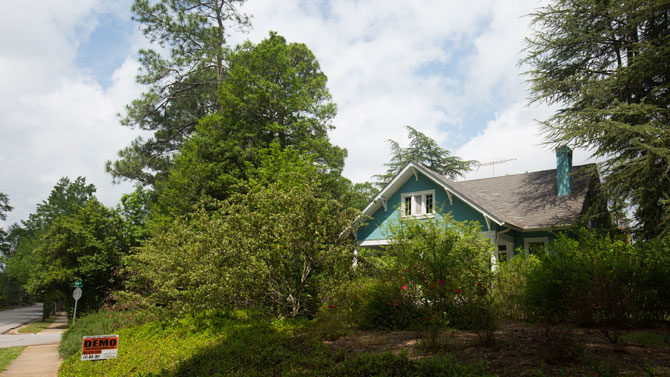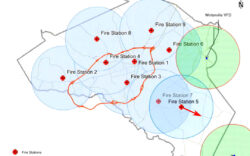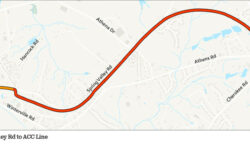“It’s not like we didn’t see this coming,” Athens-Clarke County Commissioner Melissa Link said after the owners of The Varsity applied for permits to demolish seven nearby structures, potentially allowing them to raze several historic houses to make way for a mega-development.
The same could be said for the looming Milledge Circle demolition that has sparked a scramble to create a historic district in Five Points, or any number of crises over the years. Athens once again finds itself behind the eight-ball.
The Varsity has been quietly buying up surrounding properties since last year, leading to speculation that it would redevelop the block surrounded by Milledge Avenue and West Broad, Chase and Reese streets into a mixed-use development with apartments and a grocery store. Parcels along Broad are zoned for dense commercial use, while those on Reese are zoned for low-density multifamily units.
The Gordy family wants to demolish the Dairy Queen that shuttered last year, along with the tire shop next door and four houses on West Broad and Reese streets. Link, who represents the area, said she has already exercised her power under county law to put a hold on those permits for 90 days. “I have activated the 90-day delay, and I have every intention of seeking a long-term moratorium,” she said.
Long-term planning for the neighborhood is underway, of course. (Athens is very good at planning; it’s acting on those plans that gives us trouble.) Officials with the ACC government, Clarke County School District, Athens Housing Authority and the Athens Land Trust, as well as residents, have sensed development pressure coming to the Hancock Corridor for years. They partnered to hire a consultant to produce a “feasibility study” on improvements and protections in the West Broad/Hancock Corridor/Rocksprings area. A draft was finished in March, laying out possibilities like a Brooklyn Creek greenway and redeveloping public housing. But it said little about the corridor north of Broad, and nothing about gentrification—the issue that spurred the study in the first place.
Five Points is gentrifying, too, in its own way, if you can call going from upper-middle-class to absurdly affluent “gentrification.” People are paying two-thirds of a million dollars and tearing down perfectly good houses to build their North Oconee dream home. This kind of thing has been going on in Five Points for years, but for a decade or more a historic district has just been talk. Even passing an infill housing ordinance that addresses out-of-scale development took years, and it says nothing about teardowns.
Back on Reese Street, Commissioner Jerry NeSmith said his goal is to save the historic (and affordable) housing in that neighborhood. Ideally, that would be through a zoning overlay—which would allow commercial development in appropriately zoned locations—rather than a historic district, he said. “We will find a way to limit demolitions of this housing stock, which is working-class housing,” he said.
The four dwellings on Reese Street are listed on the National Register of Historic Places, as well as in the ACC Comprehensive Plan as a possible future local-historic district. One was built by former slaves who became dentists and later was the home of A.H. Burney, a prominent educator and the namesake of Burney-Harris High School—the city’s black high school before integration, now known as the H.T. Edwards building—and Burney-Harris-Lyons Middle School.
As NeSmith pointed out, commercial development is perfectly appropriate for Broad and Milledge. And one might question whether a drive-through with an infinity parking lot is the highest and best use of that valuable land. Just like the zoning changes that led to the luxury student high-rises downtown, though, the decision to zone that residential neighborhood multifamily could have unintended consequences. People are moving here, and they need somewhere to live, which means the city core will get denser, which will bring new business and make it easier to provide services like better transit that many residents want. But at what cost? It’s a question this community has yet to fully confront.
Like what you just read? Support Flagpole by making a donation today. Every dollar you give helps fund our ongoing mission to provide Athens with quality, independent journalism.










